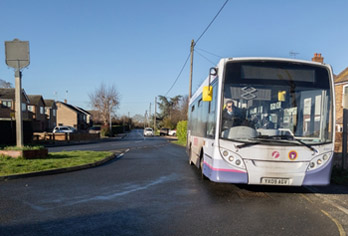A senior council transport boss has warned that inadequate government cash funding for local authority bus service improvement plans (BSIPs) could lead to wholesale changes to public transport in rural areas.
Ann Carruthers (pictured), director of environment and transport at Leicestershire County Council and the first woman to chair ADEPT’s Transportation and Connectivity Board, echoed recent concerns from transport campaigners that the sector could see cuts to services or cash that had been earmarked for improving local buses diverted to prop up services that are not viable.
Although the Government’s flagship ‘Bus Back Better’ National Bus Strategy originally pledged £3bn to improve services, much of this cash appears to have been spent subsidising services during the pandemic and there is now just £1.2bn to be split between councils.
Local transport authorities were supposed to have drawn up an enhanced partnership (EP) scheme with operators by the end of this month to qualify for funding, although this deadline has been put back by a month.
Speaking to Transport Network, Ms Carruthers said: ‘Despite the National Bus Strategy seeking ambitious – that’s what we were asked to put in – plans for passenger transport, providing a step change, in some areas it’s going to be about trying our best to maintain minimal services.’
She said that her authority, which is setting up an EP, has put in a bid for funding but has not yet had an allocation: ‘A lot hinges on those announcements. It’s fair to say that public transport in rural areas is struggling because the patronage isn’t there. We have seen more service withdrawals and service reductions.
‘I’m really pleased at the extension of the Bus Recovery Grant for another six months; that has made a difference and staved off some further withdrawals and a lot will depend on either the market coming back relatively quickly, which unfortunately I’m not particularly hopeful of, and then seeing what comes out of the BSIP.
‘And I do think if the BSIP for the likes of rural areas doesn’t deliver significant amounts of funding, that we are really going to have to re-envisage what we know as public transport in rural areas.’

J M Ritchie/shutterstock.com
She added: ‘I do think for future sustainability we are going to have to work with our communities for them to put in place different offers. It’s going to be more [Demand Responsive Transport], other connections and looking at, with ADEPT, 30 minute neighbourhoods.’
Ms Carruthers said that her authority was working with WSP on the issue: 'This is about how do you make your rural areas, a network of small rural communities, more sustainable, so they have the services they need and they can access [others] without everyone having to get into the nearest city of the nearest market town.’
She added: ‘So I do think we are going to have to re-envisage how some of our rural areas do access the services they need or how the services get to them, because the traditional model of a single decker running round the countryside, the country lanes, isn’t particularly sustainable.’